#or people are being violently colonised
Explore tagged Tumblr posts
Text
Barbecues this. Tim tams that. Come on guys, be honest, Australian culture is complaining about the government but refusing any systemic change
#also intergenerational trauma#literally every symptom of intergenerational trauma is just a cultural norm#no matter what group you’re in#it’s hilarious#but nah#it’s beaches#australia#Australian culture#Australia politics#Australian#australian politics#cultural politics#ausgov#what can I say#most of us are either people who migrated here after abuse by the our countries original political system#or people are being violently colonised#or both
3 notes
·
View notes
Text
One of my favourite things about Arcane is that all the couples can be read as toxic, which is GREAT.
I'm tired of people bringing morality debates into dark media. Let dark media be fucking dark. You guys wouldn't survive a day in the TMA fandom, needing everyone to be as good as gold. How are they going to make for enjoyable complex characters if they're not morally grey. In fact, I wish there'd been more expansion on just how morally black they can become!
"CaitVi is so toxic" According to lesbian statistics, that sounds just about accurate. 💀 Heck, I wish Caitlyn had done more (Not really, but it would have been nice to further explore the darkness in her heart). Isn't it adorable how she immediately folded as soon as Vi called her cupcake? Caitlyn's like one of those villains that will consistently do the most....until it comes to someone else hurting her girlfriend. The only one allowed to hurt her girlfriend is her. 💀
Then let's talk about Vi. Someone pointed out how Vi never cared about Zaun's independence in the first place and many people yelled that they were wrong. But actually, they were right. Vi never wanted Zaun. Zaun was Silco's dream, and Jinx inherited that dream cause Silco would never shut up about it. Vi wanted Piltover to take responsibility for all the shit they allowed to happen in the Undercity. That's a part of the reason she joined up with Caitlyn in the first place. Let's not forget she wasn't dissuaded when she dragged Jayce down to fight with her and he killed a child. Children been dying, it's been her whole life. Someone needed to do something about it, and Zaun would have just isolated the people from all the privileges that Piltover SHOULD have been providing for them. Some people just can't accept that Independence cannot in fact solve every problem, and sometimes independence is colonisers running away from the responsibility of fixing the mess that they started in the first place.
Besides, we all know Vi joined up with the Enforcers because "I feel like I am worthless if I can't be of service." She'd already run out of family members to serve, Caitlyn was the next best thing. She's just like Jayce.
And speaking of Jayce, let's talk about his violent levels of codependency with anyone who'll give him attention. People LOOOOVE to talk about Mel, but it's there with Viktor too. When bro wasn't basing his worth on his inventions, he was centering it around Viktor.
Viktor who decided at some point in his life that he would not LIVE without Jayce. He was fine dying without him, but living without him was unacceptable. Oh how healthy. 🙄😂 Viktor be the kind of toxic ex to threaten divorce 500 times over, then burn the world when you actually leave him. Jayce is no better cause he's the kind of guy to keep going back to his toxic Ex.
Yes, Mel is manipulative. That's what I love about her. How are you guys failing to give this woman the praise of being an outsider in Piltover, but running their entire council. 💀 Girl raises her hand once and the whole government starts spinning. She was the best sugar mummy Jayce and Viktor could ever ask for. She kept the whole city running. Literally the entire of Piltover dancing on her palm. And yes she manipulated Jayce but let's not forget she thought that was a love language. 💀 You wanna be mad at someone, be mad at Ambessa for raising her that way.
I also don't think it's fair to blame her for the Undercity situation, she's not native. Monkey see, monkey do, and not a single one of those Council members actually cared about the situation down there, it was deplorable. 💀 Jayce did way more in his two weeks as Councillor than any of those drug pushing, money laundering, Piltovian heads of government.
And that just covers MelJayVik, we don't even need to get fully into TimeBomb, cause we know what's wrong there. 💀 Surely we have not forgotten the many teammates Jinx has killed, but making sure to never kill Ekko cause that's her man. Ekko has a lot to unpack, like how his consistent and unwavering love for Jinx is an indication of a lot of doors he might not be ready to open. I know they dynamics go crazy and I love to see it.
Ambessa and Sevika are a crack ship but I'm sure we all know bedroom dynamics go crazy with Mrs. Warlord and Miss Liberation. I love it when characters clash in a toxic heap. It's insane and should be explored.
Quit saintifying my toxic ships with your woke morality debates. If you want everyone to be sunshine and rainbows then you should be watching literally anything else. 💀 "It's not healthy." GOOD, I like it that way. 💀 Angst, spice and trauma are the recipe for a plethora of explorative fanfiction. Any of their dynamics can be taken in any toxic direction and I want that EXPLORED.
#arcane#arcane netflix#caitlyn#caitlyn kiramman#caitlyn arcane#vi arcane#violet arcane#jayce arcane#jayce talis#caitvi#caitlyn x vi#vi x caitlyn#viktor arcane#viktor x jayce#jayce x viktor#meljayvik#meljay#jayvik#timebomb#ekko x jinx#jinx x ekko#ambessa x sevika#ambessa medarda#arcane ambessa#I'm gonna need Arcane fans to quit ruining the opportunity to get dark fics out of all this
684 notes
·
View notes
Text
No Israeli was raped, no Israeli children were beheaded, the hostages are treated better than Israel treats anyone who isn't jewish, and even the stupid zionist bitch everyone is martyring is apparently still alive and being treated in a PALESTINIAN HOSPITAL
Meanwhile, Palestinian people have been routinely raped by IOF (men AND women), are being bombarded nonstop in a way never seen before, babies and children are being pulled out of rubble dead, their only exits blocked or destroyed, a complete blockade and shutting down all food transport, electricity and water, medics and press being targetted to cover everything up, Israelis have telegram groups filled with images and videos of Palestinians getting killed and laughing at it, and all of these war crimes are being documented by the fucking facist in charge himself on twitter
Even all their allies are being threatened with war, the Egyptian border already bombed in an attempt to prevent humanitarian aid, Lebanon's border bombed to prevent anyone from providing military aid
And SOMEHOW all of you are mad at the Palestinian people? Calling them savages and animals? You make me fucking sick and I hope you know you're ignorance and stupidity is empowering the violent colonisation happening right now
4K notes
·
View notes
Text
lrb I am really bothered by the endless questioning I see of Palestinians about their vision for Israelis in a decolonised Palestine
it always seems to come with the following unspoken undertone: "assure me that decolonisation won't be violent and that settlers won't lose their colonial property or else decolonisation isn't worthy of my support and shouldn't happen."
And the thing that really gets me is that they're coming from a belief that an imaginary future possibility of violence or loss of property towards settlers is 100% unacceptable, but the current, ongoing violence and dispossession of Indigenous people must innately BE acceptable because it is the option they will support if they are not assured that decolonisation will cater sufficiently to the settler.
I'm going to spell out our position as settlers in settler colonies: our current position is completely unjust. It was created and is maintained through unimaginable violence.
Decolonisation absolutely should mean settlers do not get to continue being benefactors of injustice. It does mean that the dispossessed should regain access to their land and regain authority over their resources. That does mean taking them back from the settler apparatus.
How violent that process is is entirely dependent on the settlers. Settlers can absolutely side with the colonised. They can support justice for Indigenous people. They can support Indigenous sovereignty movements.
Working class settlers can understand class warfare through the lens of colonialism and fight for shared freedom from the ruling class and justice for Indigenous people. Marginalised communities can see how their marginalisations revolve around colonial paradigms and fight alongside Indigenous peoples to dismantle them.
But if settlers choose to violently uphold a system of theft and murder against Indigenous communities, those communities have a right to resist. Including with violence.
Where settlers in Palestine fit into a free Palestine is up to them. And settlers in Aotearoa, in Australia, and in Turtle Island also need to make those choices.
But do understand that settler colonialism is always genocidal. Is always police states and police brutality. Is always war. Is always dehumanisation. Is always homelessness and statelessness and loss of autonomy. The status quo IS violence in the absolute most extreme. And Indigenous people have a right to fight back.
3K notes
·
View notes
Text
every time i look into the comments section of any fucking post that talks about indigenous people and our land it's always whitefella who are like "okay but how exactly do you think 'giving the land back' is going to work". you are TELLING ON YOURSELF if the first thing that you think when you think of landback is of indigenous people taking the land back by force and forcing everyone to move out of the country and killing people if they don't comply. idk how to tell you this but indigenous people are not violent colonisers whose first thoughts are of murder, rape and genocide when it comes to having our land being given back to us. the idea that land cannot be given back to indigenous people because that would cause white people to be without a home is a very white colonialist thing to think, and it is the very mindset and arguments that white people make in order to ensure that indigenous land is NEVER given back to us. if you cannot even think of A SINGLE OTHER WAY that indigenous people can be given back our land that doesn't hurt other people in the process: you have some reflecting to do. not only do you have no imagination, you also are so deep within the white colonialist mindset that peaceful options are completely out of your sight, unable to be thought of and unable to be understood. you have been flashbanged by your own whiteness.
1K notes
·
View notes
Text
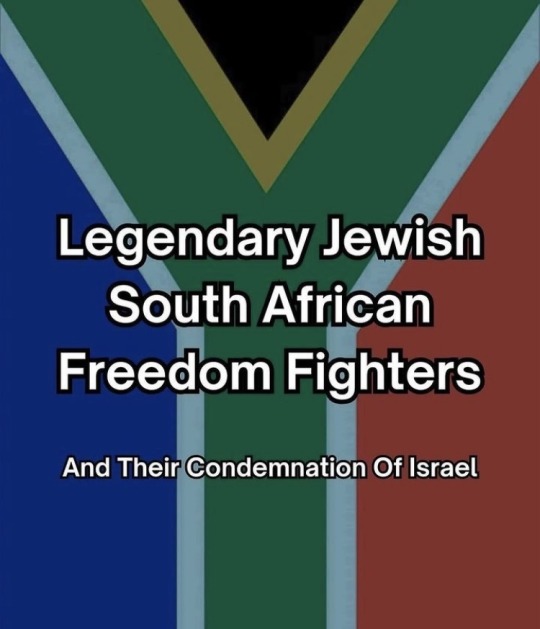
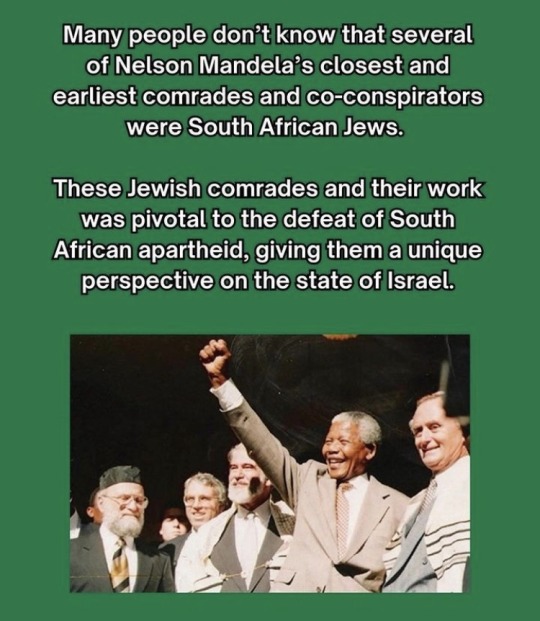
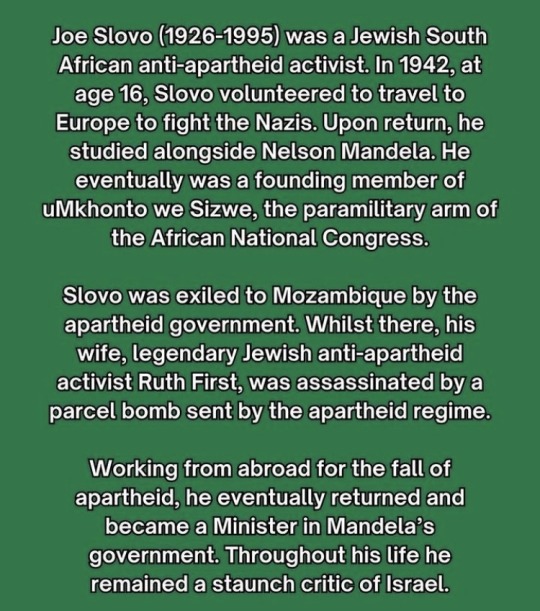
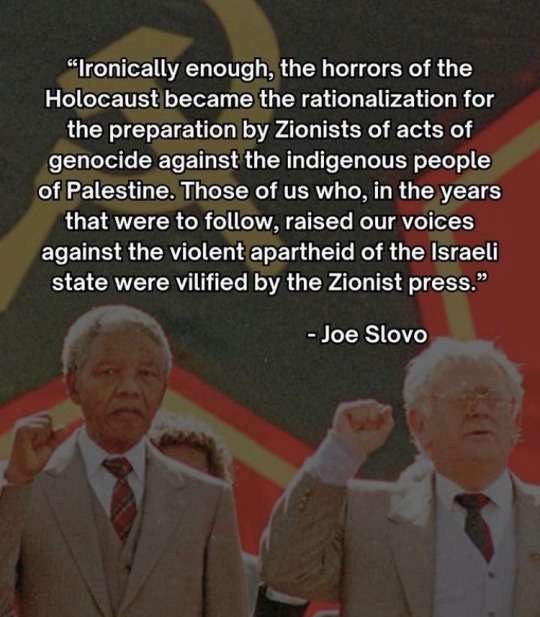
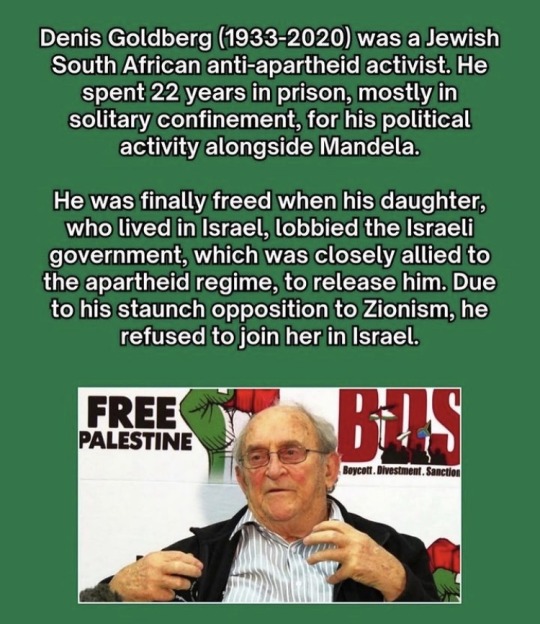
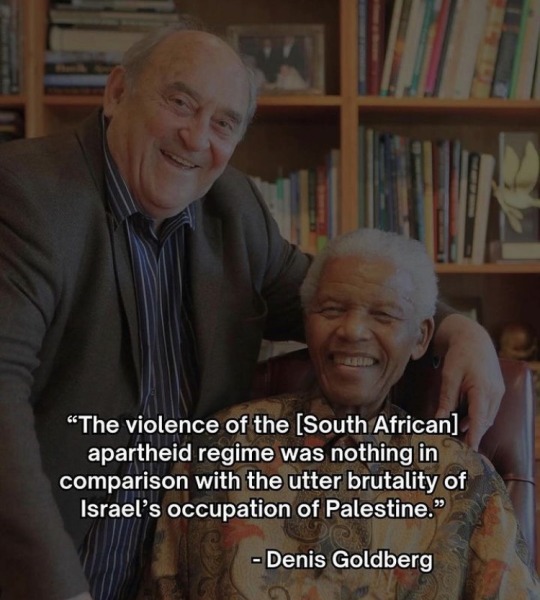
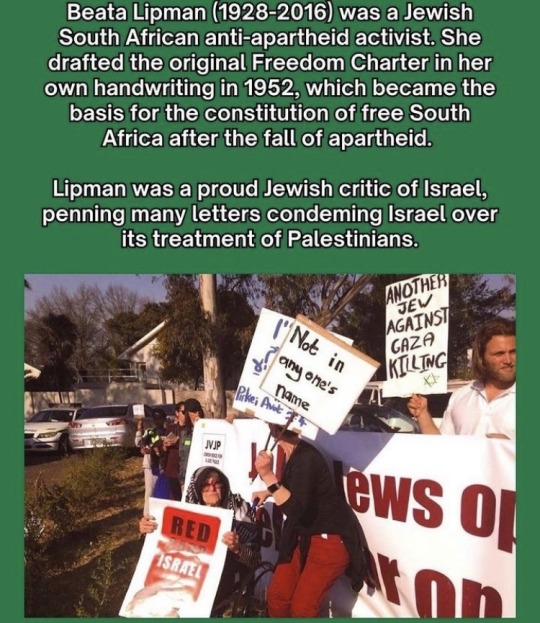
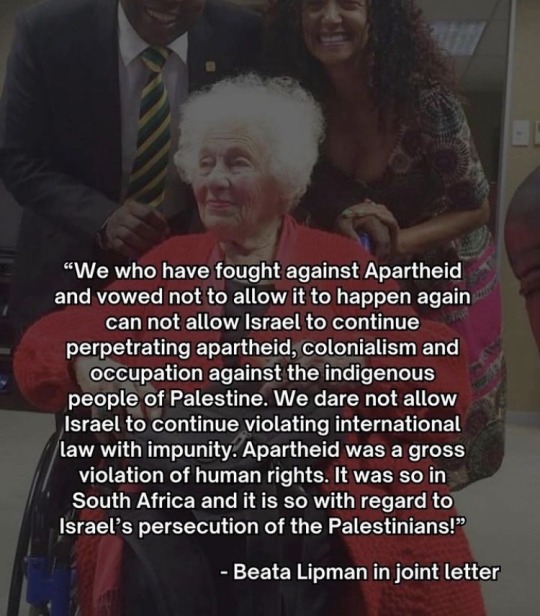
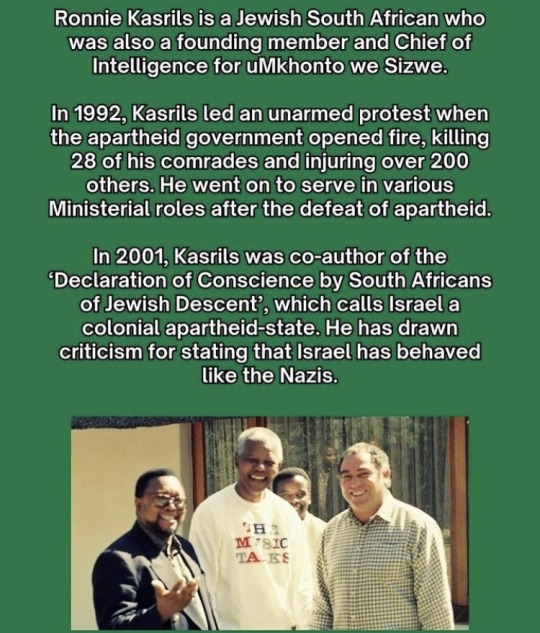
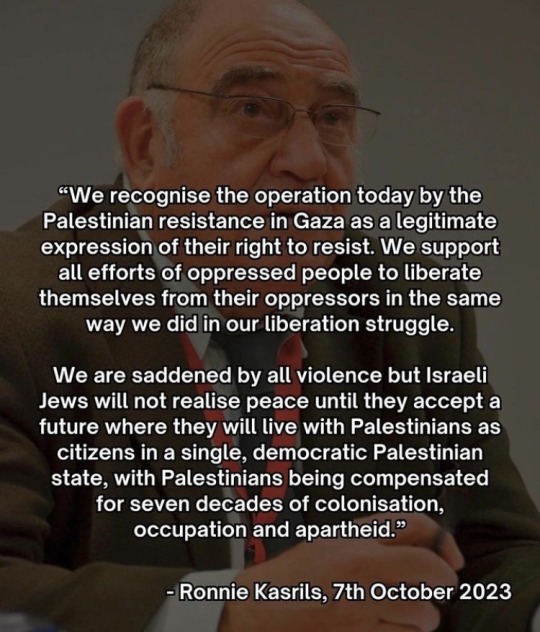
Image transcriptions below:
Legendary South African Jewish Freedom Fighters
And Their Condemnation of Israel
Many people don't know that several of Nelson Mandela's closest and earliest comrades and co-conspirators were South African Jews.
These Jewish comrades and their work was pivotal to the defeat of South African apartheid, giving them a unique perspective on the state of Israel.
—
Joe Slovo (1926-1995) was a Jewish South African anti-apartheid activist. In 1942, at age 16, Slovo volunteered to travel to Europe to fight the Nazis. Upon return, he studied alongside Nelson Mandela. He eventually was a founding member of uMkhonto we Sizwe, the paramilitary arm of the African National Congress.
Slovo was exiled to Mozambique by the apartheid government. Whilst there, his wife, legendary Jewish anti-apartheid activist Ruth First, was assassinated by a parcel bomb sent by the apartheid regime.
Working from abroad for the fall of apartheid, he eventually returned and became a Minister in Mandela's government. Throughout his life he remained a staunch critic of Israel.
—
"Ironically enough, the horrors of the Holocaust became the rationalization for the preparation by Zionists of acts of genocide against the indigenous people of Palestine. Those of us who, in the years that were to follow, raised our voices against the violent apartheid of the Israeli state were vilified by the Zionist press."
- Joe Slovo
—-
Denis Goldberg (1933-2020) was a Jewish South African anti-apartheid activist. He spent 22 years in prison, mostly in solitary confinement, for his political activity alongside Mandela.
He was finally freed when his daughter, who lived in Israel, lobbied the Israeli government, which was closely allied to the apartheid regime, to release him. Due to his staunch opposition to Zionism, he refused to join her in Israel.
—
"The violence of the [South African] apartheid regime was nothing in comparison with the utter brutality of Israel's occupation of Palestine."
- Denis Goldberg
—
Beata Lipman (1928-2016) was a Jewish South African anti-apartheid activist. She drafted the original Freedom Charter in her own handwriting in 1952, which became the basis for the constitution of free South Africa after the fall of apartheid.
Lipman was a proud Jewish critic of Israel, penning many letters condeming Israel over its treatment of Palestinians.
—
"We who have fought against Apartheid and vowed not to allow it to happen again can not allow Israel to continue perpetrating apartheid, colonialism and occupation against the indigenous people of Palestine. We dare not allow Israel to continue violating international law with impunity. Apartheid was a gross violation of human rights. It was so in South Africa and it is so with regard to Israel's persecution of the Palestinians!"
- Beata Lipman in joint letter
—
Ronnie Kasrils is a Jewish South African who was also a founding member and Chief of Intelligence for uMkhonto we Sizwe.
In 1992, Kasrils led an unarmed protest when the apartheid government opened fire, killing 28 of his comrades and injuring over 200 others. He went on to serve in various Ministerial roles after the defeat of apartheid.
In 2001, Kasrils was co-author of the
*Declaration of Conscience by South Africans of Jewish Descent, which calls Israel a colonial apartheid-state. He has drawn criticism for stating that Israel has behaved like the Nazis.
—
"We recognise the operation today by the Palestinian resistance in Gaza as a legitimate expression of their right to resist. We support all efforts of oppressed people to liberate themselves from their oppressors in the same way we did in our liberation struggle.
We are saddened by all violence but Israeli Jews will not realise peace until they accept a future where they will live with Palestinians as citizens in a single, democratic Palestinian state, with Palestinians being compensated for seven decades of colonisation, occupation and apartheid."
- Ronnie Kasrils, 7th October 2023
#free palestine#palestine#gaza#hamas#israel#fuck israel#freedom fighters#resistance#south africa#israel is an apartheid state#apartheid#genocide#from the river to the sea palestine will be free
2K notes
·
View notes
Text
The backlash is here, and it’s only just begun
For years we were told to stay quiet. To be kind. To let ourselves be redefined by people who don’t know what it’s like to live as a woman from birth. We were told that biology is bigotry, that boundaries are exclusion, that recognising material reality is hate speech.
We were gaslit into thinking that saying “women are adult human females” was somehow controversial. That wanting single sex spaces made us violent. That acknowledging the differences between male and female bodies made us fascists. All while actual women were being shouted down, threatened, and blacklisted for saying the most basic truths.
But guess what. People are done pretending. The backlash is here and it’s spreading like wildfire.
In the UK, self ID laws are being rolled back. In Europe, feminists are reclaiming their language and holding their ground. Courts are beginning to recognise that feelings don’t override facts. Female athletes, prisoners, rape survivors, lesbians, and young girls are speaking up, louder than ever. And they’re not apologising for it anymore.
And the best part? You can see how badly they are losing it. The tantrums, the threats, the incoherent screaming online. Every time someone utters a basic truth like “only women give birth” or “men have physical advantages,” they spiral into a meltdown. If your ideology shatters with one sentence, maybe it was never built on anything solid. The louder they yell, the more obvious it is they know they’re losing control.
This isn’t a fringe reaction. This is a wave. And it’s not about hate. It’s about drawing the line. It’s about saying no, you don’t get to colonise womanhood. You don’t get to dismantle decades of feminist progress in the name of a gender identity that changes based on mood and makeup. You don’t get to silence women forever.
The attempt to erase sex was always doomed to fail. Because sex is not a costume. Woman is not a feeling. And reality doesn’t care how many times you scream transphobe. When the consequences start landing on real people, real bodies, and real lives, the spell breaks. And that’s exactly what is happening.
So keep mocking us. Keep calling us dinosaurs or bigots or whatever your script tells you. It doesn’t change the truth. It only makes you look more desperate.
Women are waking up. Mothers, sisters, lesbians, teachers, midwives, athletes, survivors. We are no longer alone and we are no longer scared. You called it a backlash. Fine. Then brace yourselves. Because you lit the match. We are just the fire that followed.
#politics#smash patriarchy#radical feminism#radical feminist safe#philosophy#sex matters#writing#gender critical#femininity isn’t a character#feminism#transissue#transdialogue#erased women#women
98 notes
·
View notes
Text
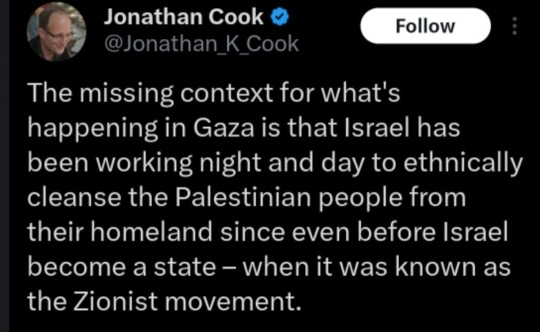
Copied from the OG Tweet as it's too long to screenshot. Source is @Jonathan_K_Cook on Twitter:
The missing context for what's happening in Gaza is that Israel has been working night and day to ethnically cleanse the Palestinian people from their homeland since even before Israel become a state – when it was known as the Zionist movement.
Israel didn't just cleanse Palestinians in 1948, when it was founded as a Western colonial project, and again under cover of a regional war in 1967.
It also worked to ethnically cleanse Palestinians every day between those dates and afterwards. The aim was to move them off their historic lands, and either expel them beyond Israel’s new, expanded borders or concentrate them into small ghettoes inside those borders – as a holding measure until they could be expelled outside the borders.
The 'settler' project, as we call it, is a misnomer. It's really Israel's ethnic cleansing programme. Israel even has a special word for it in Hebrew: 'Judaisation', or making the land Jewish. It is official government policy.
Gaza was the largest of the Palestinian reservations created by Israel's ethnic cleansing programme, and the most overcrowded. To stop the inhabitants spilling out, Israel built a fence-barrier in the early 1990s to pen them in. Then when policing became too hard from within the prison, Israel pulled back in 2005 to the outer perimeter barrier.
New technology allowed Israel to besiege Gaza remotely by land, sea and air in 2007, limiting the entry of food and vital items like medicine and cement for construction. Automated gun towers shot anyone who came near the fence. The navy patrolled the sea, stopping boats straying more than a kilometre or two off shore. And drones watched 24 hours a day from the sky.
The people of Gaza were sealed in and largely forgotten, except when they lobbed a few rockets over the fence – to international indignation. If they fired too many rockets, Israel bombed them mercilessly and occasionally launched a ground invasion. The rocket threat was increasingly neutralised by a rocket interception system, paid for by the US, called Iron Dome.
Palestinians tried to be more inventive in finding ways to break out of their prison. They built tunnels. But Israel found ways to identify those that ran close to the fence and destroyed them.
Palestinians tried to get attention by protesting en masse at the fence. Israeli snipers were ordered to shoot them in the legs, leading to thousands of amputees. The 'deterrence' seemed to work.
Israel could once again sit back and let the Palestinians rot in Gaza. 'Quiet' had been restored.
Until, that is, last weekend when Hamas broke out briefly and ran amok, killing civilians and soldiers alike.
So Israel now needs a new policy.
It looks like the ethnic cleansing programme is being applied to Gaza anew. The half of the population in the enclave's north is being herded south, where there are not the resources to cope with them. And even if there were, Israel has cut off food, water and power to everyone in Gaza.
The enclave is quickly becoming a pressure cooker. The pressure is meant to build on Egypt to allow the Palestinians entry into Sinai on 'humanitarian' grounds.
Whatever the media are telling you, the 'conflict' – that is, Israel's cleansing programme – started long before Hamas appeared on the scene. In fact, Hamas emerged very late, as the predictable response to Israel's violent colonisation project.
Israel could once again sit back and let the Palestinians rot in Gaza. 'Quiet' had been restored.
Ignore the fake news. Israel isn't defending itself. It's enforcing its right to continue ethnically cleansing Palestinians.
#gaza#free gaza#gaza strip#palestine#free palestine#news on gaza#irish solidarity with palestine#al jazeera
759 notes
·
View notes
Text
I think it's very funny when people on tumblr tell me that "decolonisation is not a metaphor". Because, uh, yeah. I know that. My ancestors were colonised and stripped of our native lands, forced to assimilate and lose our culture, forced to convert and lose our religion. Every day I work to undo that damage. Every day I study Hebrew because my family could not do so safely under colonialism. Every day I pray to a G-d that my people could not safely worship under colonialism. Every day I study and embrace ancient Jewish ways of learning, thinking and being that were lost because of colonialism. I share this knowledge with my family, with my friends, and with my community. As an academic, I am actively involved in attempting to unmake the violent and continued coloniality of my people's homeland, hoping to undo the damage caused by Brits, Romans and Turks. I do that for the benefit of native peoples in the land-- all of them. Jews, Arabs, Druze, Samaritans and Bedu all deserve equality and peace. Decolonization isn't a metaphor to me. It's a constant way of life.
And what are you, non-indigenous American goy on tumblr, doing for your decolonization? Are you learning the Cherokee language? Sioux? Muscogee? Do you spend your spare time meeting with the indigenous tribes local to your area? Do you push your representatives to help those tribes have greater access to land, healthcare, and autonomy? Can you even list the names of the native peoples whose land you walk on without looking them up?
Or does your "decolonisation" look like an occasional land acknowledgement, reblogging lip-service posts about the plights of indigenous communities, and using your political views to justify attacking Jews on the internet? 'Cause patting yourself on the back for that sure looks like a metaphor to me.
903 notes
·
View notes
Text
I mentioned it my earlier reblog but I've just gotta say that the way this fandom treats Mrs Rosehearts is actually vile. Is she a bad parent? Yes. Is she absuive? Yes. But my god it's awful how she is written or drawn being assaulted, mutilated, murdered, run over/crushed/etc and everyone is cheering on about "that bitch getting what she deserves." People gleefully going on and on and on about how they want to murder or assault her as violently as possible is horrific.
It's mysogny, obviously, I know that. But it's still so awful to see, especially since even I was guilty of things. Graphic violence against women as "punishment" for any form of wrong is so normalised that it's considered a normal reaction to "someone as horrible as her" but then I look at Mr Rosehearts and Leona's father and Idia's parents and Lilia and so on where even though they too were harmful or abusive (intentionally or otherwise) to their children, they are adored and loved.
The Knight of Dawn fights for an oppressive, colonising empire and has absolutely killed people but hey he says some nice things so he's obviously an innocent sweetiepie who just has the best intentions, he would've been a wonderful dad awww. And of course there's Lilia and all the "Lol he's so silly he forgot child Silver and Sebek in the woods for 3 days oopsie look at the funny comic I drew of it dw he feels bad" treatment he gets.
It's just. It's so infuriating. I know what Mrs Rosehearts does to Riddle is bad, but she does not deserve the treatment she gets, ESPECIALLY when Mr Rosehearts, who is absusive too because of his lack of action and emotional distance from Riddle (neglect is abusive too), is treated like a sad little victim who's "abused by that awful bitch." Riddle has two parents. Don't place all blame for everything on one.
#quinn quips#mrs rosehearts#riddle rosehearts#heartslabyul#silver vanrouge#sebek zigvolt#lilia vanrouge#diasomnia#twisted wonderland#twst analysis#<-???
99 notes
·
View notes
Text
A Zionist argument you might hear is that the Palestinian identity was only constructed very recently, either during the establishment of Israel or just prior, and that for this reason they're really just generic Arabs who could just move to other Arab countries. Palestinian historians have responded to this claim by looking for earlier signs of identification with Palestine, but regardless of how far back you can find these, it doesn't really matter when it comes to the question of what Israel is and what it's doing.
The issue of settler colonialism isn't about which people "belong" in a certain place or whether their people is "ancient" enough or have some "connection to the land" that gives them a right to live there. Settler colonialism means displacement and violence enacted on a group of people, and whether they previously identified as a singular people or many, they now share that common experience of being colonised. The category of "indigenous" or "native" is one that's constructed in the process of colonisation, not a natural category that someone belongs to by virtue of their ancient bloodline.
Even if people only began to identify as Palestinian in response to Israeli colonisation (which is not true, to be clear) it would not matter. Israel is enacting completely unjustified violence on innocent people. It has been displacing them since its inception (continuing the policy of the British colonial government which favoured European Jewish settlers and sold them land that was already inhabited) and is continuing to do so today, particularly in the West Bank. This isn't even getting into the treatment of those who live within the official borders of Israel.
The name for this is settler colonialism. It's completely unjustified, as every case of settler colonialism is, and it does not change character because of the historical identities of the colonisers or the colonised. Plenty of Jewish people have connections to the land, either recent or ancient, but it does not give them a "right" to engage in colonialism. Nobody "belongs" anywhere; people should be able to move and live where they want, but this does not justify the continuous, violent displacement of innocent people.
The only way to stop this violence is the dismantling of Israel and the creation of an independent, secular Palestine, with reparations for the displaced Palestinians, and equal political status for all, regardless of religion or ethnicity.
403 notes
·
View notes
Text
actually fake as fuck to speak about transandrophobia as a zionist. you're gonna talk about how transmascs get painted as dangerous then go on to treat arab men like violent monsters? cite sexual assault statistics then ignore the well documented pattern of sexual abuse commited against palestinians by the israeli state? You want people to acknowledge dead trans men while ignoring the thousands of dead bodies piling up in gaza. Wanna talk erasure? Western media has been ignoring or underplaying this genocide since the start. Annoyed by dead trans men being reported on as "person"? How about civilians murdered by an invading army being reported on as "dead", as if they spontaneously keeled over for no reason in particular? Wanna talk about lack of transmasc healthcare while every hospital in gaza has been bombed, sometimes more than once, by the idf?
There is no transmasc liberation without anti imperialism and anti colonialism. Not just because there are transmascs among the colonised, but because it's the same fucking forces at play in both. The same battle. You cannot disentangle them. You cannot pick and choose what you support. Without solidarity, we're all fucking doomed.
38 notes
·
View notes
Text
I find the episode “Going Native” so interesting because South Park perfectly encapsulated the continuous settler colonisation that mainland Americans inflict on the island of Hawai’i, as well as exposing the stereotypes that are reinforced against the indigenous population.
The episode starts off with Butters being so uncharacteristically angry, beating up a kid for having diabetes and calling out most of his friends for their self proclaimed expertise, their self-centred nature, their selfishness and cowardice. He carries this anger with him, even when talking to his parents, despite the fact he is usually incredibly obedient and scared of what they might do to him otherwise.
His parents “understand” where this anger is coming from and explain that it is because he is “different” and not from this place but “native” to Hawai’i and that is why he is experiencing these angry and violent spells.
While Butters is not a native Hawaiian, he is presented that way for the plot of the episode and this is when harmful and racist stereotypes of indigenous peoples are reinforced by the foreigners. Natives have historically been seen as angry, selfish and violent “savages”, people unwilling to “share” their land and therefore result to killing and warfare. In terms of Hawaiians specifically, they were painted as people who were uncivilised to rule and often times depicted as caricatures in the press to justify the colonisation of the island.
Not only that, but we also see the bastardisation and co-optation of native Hawaiian culture by foreigners. Use of phrases like “ancient ruins”, the display of making Kenny do a “trial” on a surfboard when Hawaiian are well known voyagers and the very idea of Butters having a “coming of age” ceremony all points to the practise of foreigners “enjoying Hawaiian culture.” However, the culture is often a westernised version of traditional practises. A real life example of this is the “classic” portrayal of a hula dance with a sexualised woman wearing a coconut bra, when in reality the Hula is steeped in Hawaiian folklore and history. It is the same in the episode, with the use of native terminology but in reality these “rituals” and “ancient ruins” were just cheaper copies of tradition.
The biggest take away from this episode is the amount of native Hawaiians that are shown as working for the foreigners that are living and exploiting their land. In the airport, at the food places, as security in the residence. They have to stand there and take people saying they are “native”, flashing their awards card that “proves” they’re “local” while the indigenous people are forced to work for their colonisers. It’s a direct reflection of life in Hawai’i for the natives. A large number of the population live in poverty, with many needing to work in resorts in order to survive, despite the fact that these resorts are taking their native land and making it hard for them to live at home. Pricing them out of their native land.
This episode may be fun, it might focus on two fan favourite characters, but it also gives a good insight on settler colonialism.
#I was going to do a whole essay style analysis with citations but I got impatient#I might still do it I wrote an essay for my degree on this so I have a lot of sources I could use#I’m also indigenous (not to North America or Hawai’i) but indigenous so this is inportant. indigenous solidarity !!#south park#txt post#south park meta#south park analysis#kenny mccormick#butters stotch#sp kenny#sp butters#south park kenny#south park butters#linda stotch#stephen stotch#sp Stephen#sp linda#sp#noreen’s think pieces#sp bunny#south park bunny#going native
64 notes
·
View notes
Text
yellowjackets racism discourse
i know a lot of people have been criticising s3 and its writers for being sopposedly racist in terms of mari's dehumanising treatment, but when i watched the finale i had some completely different thoughts.
i think that the fact it was almost shauna's choice that mari was hunted, and not the wilderness, is a metaphor for colonialism and its brutality. mari being scalped and her hair worn like trophies? hair is so important to women of colour - for indian women, for black women, for indigenous women, it is a symbol of who they are. to have it so grotsquely displayed and worn like its somehow a worthless commodity but also an exotic prize?? mari is basically being conquered and claimed before she's even eaten. being physically drained of blood and hung upside down like an animal? its a destruction of female sexuality and spirit perpetrated by white colonisers, where shauna's hunt and cannabalism symbolises how indigenous women were percieved to be uniquely beautiful and alluring but also inferior in every way, therefore deserving to be consumed, swallowed, forgotten. shauna being an unwanted 'queen' too, in conjunction with the moral decay of lottie and how they enable each other's primal desires? the wilderness has been manipulated and moulded, the natural made unnatural, refelcting saviour/savage imagery, where the two become reversed (the violent supression from the colonisers is percieved to be actually 'savage' rather than the indigenous people they're oppressing, raping and murdering).
i think some concerns about simone and sammi's storyline are very valid - but we do know there are 5 seasons and so hopefully they'll give that the attention it deserves. i haven't really seen anyone else talk about this (and this is my opinion as a girl of colour) because it seems that most people aren't really thinking thinking about this season but being very literal (murder of girl of colour = racist)
the writing choices feel very intentional to me, but of course there could always be the factor of racist writers/showrunners as has been the case for probably almost every tv show ever...
but i just thought i'd share :) would love to hear some thoughts/agreements/disagreements
24 notes
·
View notes
Text
tbd later
i think tht pisses me off the most abt the dalish in terms of how theyre written is the conflation between like. land back movements when it comes to the dalish vs zi onism and how basically this is addressed in truly horrific ways no matter which route you decide to go down
others have done loads of posts on the dalish being allegorical for indigenous peoples, so i wont reiterate that too much. but the problem is that with the addition of datv this is... simply not true. the elves are not the first peoples of thedas -- the dwarves are. the elves, mirroring z ionism, literally show up in the waking world, and violently colonise the space and hoard the resources. im still 98% sure that solas' orb in dai was a titan heart, and the elves were literally mining for lyrium. there are direct parallels between the arguments that z ionists make for settler colonialism in p alestine vs the in-world justifications for the "war" on the titans & dwarves. the ancient elves literally steal the bodies of the titans, mirroring i srael's history of stealing organs and even skin from p alestinian prisoners. elves' arguments of the lands being theirs etc is simply... untrue. and land back movements for the elves when we take this history into account is... an argument for settler colonialism. the land they were "given" by maferath, i.e. the dales, was literally never theirs but it gains such a sinister overtone, and again, parallels western nations "giving" p alestine to z ionists who demanded a state, with the assumption it was "theirs" first. and it wasn't.
at the same time, bw has gone out of it's way to draw clear parallels to the history of the j ewish peoples - between things like the long walk, the exalted march on the dales (harding even says "never again" when you get to the exalted plains), history of slavery for modern elves, etc - all create such a frustrating conflation between j ewish people and z ionism that pisses me off to no fucking end.
it's damn near impossible to solve for me as someone who is neither indigenous nor j ewish, because this representation is not for me. either i ignore datv and the end half of dai to draw more strongly on parallels between indigenous peoples and the dalish, at the expense of ignoring j ewish representation in the narrative. or i buckle down and directly address the z ionist nonsense, which leaves me with a horrible argument for indigenous land back movements. like how do i rework this!!!!!!!!!!!
when i fucking get you, bioware. when i fucking get you, david gaider!!!!!!!!!!!
#im struggling to articulate this clearly but im so so so so so frustrated!!!!!!!!!!!!!!!!!!!!!!!!!!!!!!!!!!!!!!!!!!!!!!!!!!!!!#it feels like i can rework sooo many things. but this is just. GRRRRRRRRRRRRRRRRRRRRRRRRRRRRRRRRR. rly struggling post da tv w this#my initial concept was just to make all the elves desi. bc of parallels i'd been drawing btwn things like the caste system n society in#tevinter and the history of the mughal empire's colonisation of india etc etc so the argument of social justice here would be framed#differently but that's also. like. a separate problem. AUGH. i hate it here!!!!#vee rewrites da#bioware critical#writing woes#added some additional spaces bc i dont want it to show up in the tags lmao itll just detract from things but#i havent seen a lot of ppl talking abt this. or maybe i have missed existing posts idk but eughghgh#ok my hand is cramping again... offline i go
23 notes
·
View notes
Text
For the [checks notes] 256th time, Jay is not intended to be the bad guy. Ever. He was used to subvert the racist trope of colonised people being labelled as "terrorist" purely because they used a fraction of the violence inflicted upon them against their colonisers to fight back (the worst part is he isnt even violent. He's a journalist & his powers are entirely about evasion & self-defense).
He is a part of a group called the Revolutionaries & his pseudonym is "The Truth".
They could not have been more ham-fisted about this if they tried, the only other option was Jay turning to the camera and saying "The US & other supposedly First World countries villainize brown people & colonised people such as myself evil & call us terrorists for merely fighting for our freedoms in order to justify our annihilation. Everyone can fall for propaganda kids!" and then Jon says "You're right Jay, the US is an imperialist power which must be stopped!"
And yet......people think he's evil. Comics are political and have been since day one & you have to set aside fanon & shipping goggles at least once ti actually examine the politics of the story please please its very fun & enlightening.
#jon kent#jay nakamura#superman#superman son of kal el#jonjay#gossamer#the truth#soke#secret six#absolute power
51 notes
·
View notes